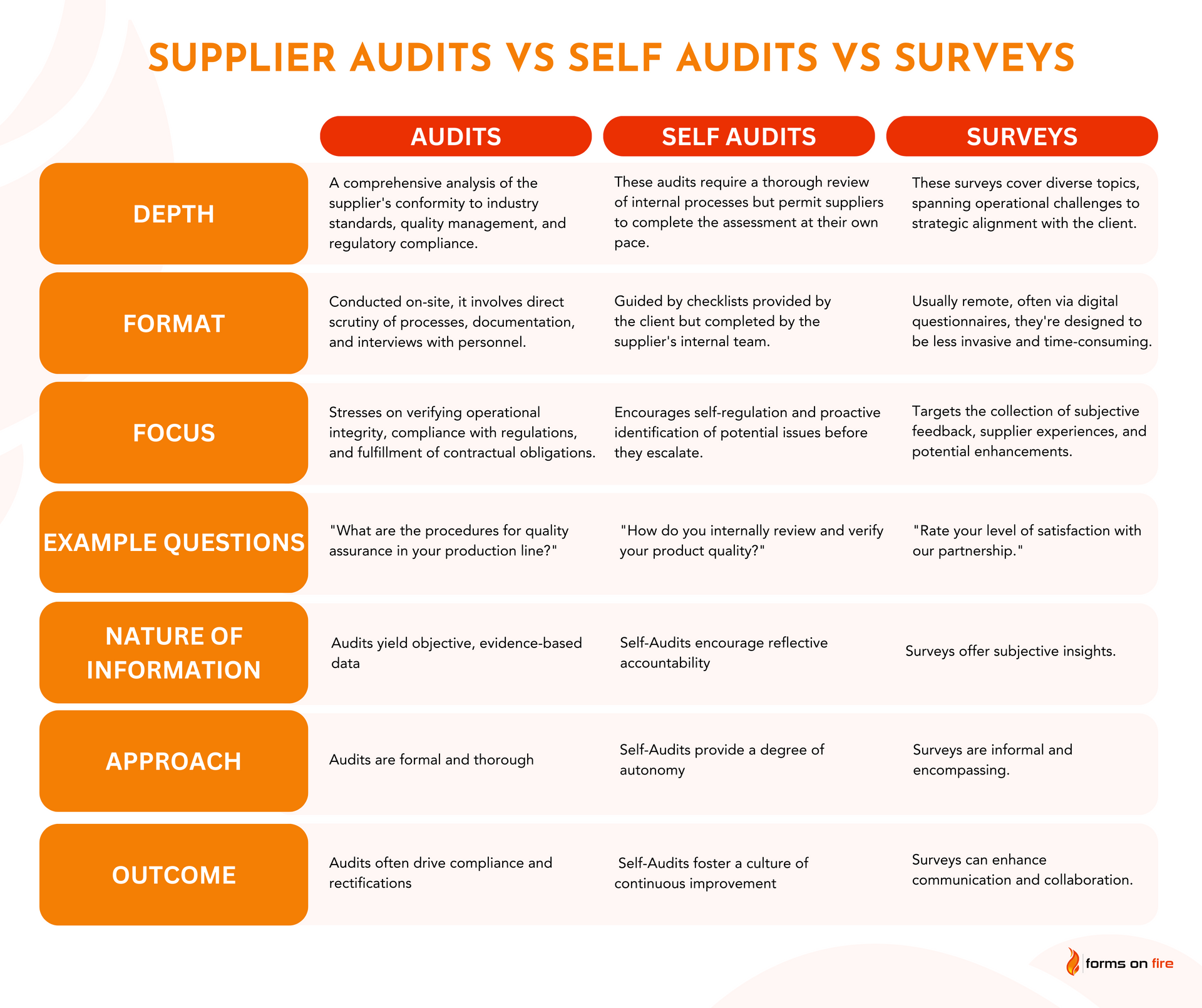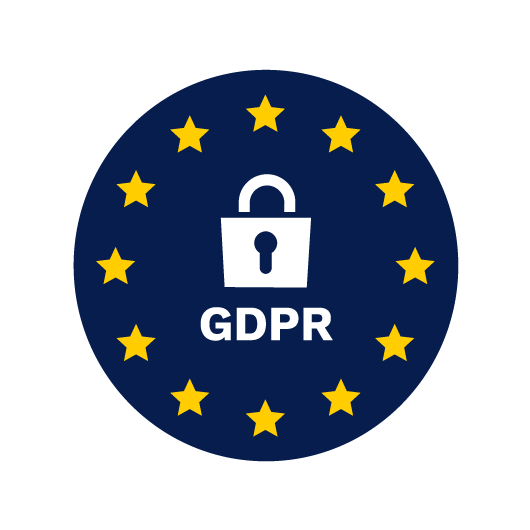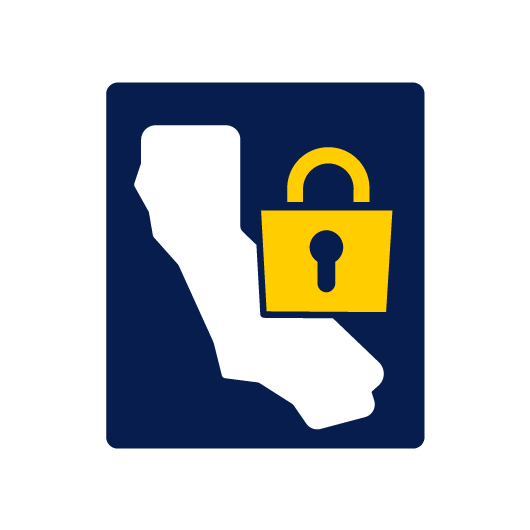Navigating the Nuances of Vendor Management: Supplier Audits, Supplier Self-Audits, and Supplier Surveys
As we delve deeper into the realm of vendor management, our focus broadens to encompass a trio of assessment tools: Supplier Audits, Supplier Self-Audits, and Supplier Surveys. Together, these instruments offer a complete view of supplier engagement. Join us as we explore their roles, distinguish their methods, and uncover the unique insights each brings to the table.
Supplier Audits: The External Examination
A Supplier Audit is an external inspection, a deep dive into the supplier's operations by an independent auditor, providing an objective assessment of compliance and performance.
Key Aspects:
- Depth: This is a thorough exploration, examining the supplier's adherence to industry standards, quality management, and regulatory compliance.
- Format: Conducted on-site, it involves direct scrutiny of processes, documentation, and interviews with personnel.
- Focus: Stresses on verifying operational integrity, compliance with regulations, and fulfillment of contractual obligations.
Example Audit Questions:
- "What are the procedures for quality assurance in your production line?"
- "How do you maintain compliance with our specified regulatory standards?"
- "Provide evidence of your most recent environmental and safety certifications."
Supplier Self-Audits: The Introspective Assessment
Supplier Self-Audits are introspective assessments where suppliers evaluate their own operations against a set of agreed criteria.
Key Aspects:
- Depth: These audits still demand a rigorous check of internal processes but allow suppliers to conduct the assessment at their own pace.
- Format: Self-audits are typically guided by checklists or standards provided by the client but completed by the supplier's internal team.
- Focus: Encourages self-regulation and proactive identification of potential issues before they escalate.
Example Self-Audit Questions:
- "How do you internally review and verify your product quality?"
- "Detail the steps you take to ensure continuous improvement in your operations."
- "Describe your process for internal compliance checks and risk management."
Supplier Surveys: The Broad Feedback Mechanism
Supplier Surveys, on the other hand, are less about inspection and more about perception, serving as a broad feedback mechanism to gauge satisfaction and areas for improvement.
Key Aspects:
- Scope: These surveys canvass a wide array of topics, from operational challenges to strategic alignment with the client.
- Format: Usually remote, often via digital questionnaires, they're designed to be less invasive and time-consuming.
- Focus: Targets the collection of subjective feedback, supplier experiences, and potential enhancements.
Example Survey Questions:
- "Rate your level of satisfaction with our partnership."
- "What improvements would you suggest for our collaborative processes?"
- "What obstacles do you encounter when aligning with our expectations?"
Comparison: A Three-Way Mirror
While all three tools are integral to comprehensive vendor management, they reflect different facets of the supplier-client relationship.
- Nature of Information: Audits yield objective, evidence-based data; Self-Audits encourage reflective accountability; Surveys offer subjective insights.
- Approach: Audits are formal and thorough; Self-Audits provide a degree of autonomy; Surveys are informal and encompassing.
- Outcome: Audits often drive compliance and rectifications; Self-Audits foster a culture of continuous improvement; Surveys can enhance communication and collaboration.
Crafting the Right Approach
The key to effective vendor management lies in asking the right questions in the right context.
- In Audits: Precision and evidence are paramount, with a focus on verification.
- In Self-Audits: The emphasis is on introspection and proactive self-governance.
- In Surveys: Openness and subjectivity prevail, seeking honest feedback and suggestions.

Harmonizing the Trio
Supplier Audits, Supplier Self-Audits, and Supplier Surveys are the three harmonious voices in the chorus of vendor management. While an audit is a detailed inspection by an external party, a self-audit is a reflective process that empowers suppliers to take charge of their compliance and improvement. Surveys open dialogues for continuous relational and process enhancement.
By integrating the meticulousness of audits, the reflective nature of self-audits, and the wide-ranging insights of surveys, businesses can achieve a dynamic and responsive vendor management strategy. Each has a distinct pitch in the symphony of supplier relations — in concert, they create a melody that resonates with efficiency, quality, and mutual growth.
Embrace the unique virtues of each, and let them guide you to a more robust, transparent, and collaborative future with your suppliers.
Company
Platform
Resources
Contact
+1 (425) 214-1920
10900 NE 4th Street, Suite 2300
Bellevue, WA 98004




